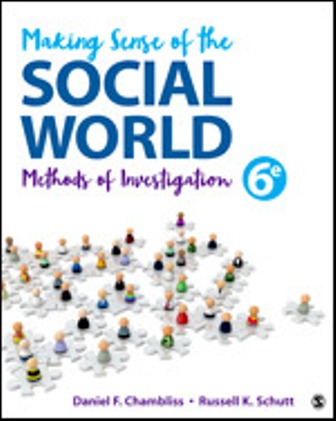Test Bank for Making Sense of the Social World Methods of Investigation 6th Edition By Daniel F. Chambliss, Russell K. Schutt
Test Bank for Making Sense of the Social World Methods of Investigation 6th Edition By Daniel F. Chambliss, Russell K. Schutt ,
$35.00
Description
Test Bank for Making Sense of the Social World Methods of Investigation 6th Edition By Daniel F. Chambliss, Russell K. Schutt ,
Table of Contents
ABOUT THE AUTHORS
PREFACE
ACKNOWLEDGMENTS
Chapter 1. Science, Society, and Social Research
Learning About the Social World
Can Social Scientists See the Social World More Clearly?
How Well Have We Done Our Research?
Conclusion
Key Terms
Highlights
Student Study Site
Exercises
Chapter 2. The Process and Problems of Social Research
What Is the Question?
What Is the Theory?
What Is the Strategy?
What Is the Design?
Conclusion
Key Terms
Highlights
Student Study Site
Exercises
Chapter 3. Ethics in Research
Historical Background
Ethical Principles
Conclusion
Key Terms
Highlights
Student Study Site
Exercises
Chapter 4. Conceptualization and Measurement
What Do We Have in Mind?
How Will We Know When We’ve Found It?
How Much Information Do We Really Have?
Did We Measure What We Wanted to Measure?
Conclusion
Key Terms
Highlights
Student Study Site
Exercises
Chapter 5. Sampling and Generalizability
How Do We Prepare to Sample?
What Sampling Method Should We Use?
Conclusion
Key Terms
Highlights
Student Study Site
Exercises
Chapter 6. Causation and Experimental Design
Causal Explanation
What Causes What?
Why Experiment?
What If a True Experiment Isn’t Possible?
What Are the Threats to Validity?
How Do Experimenters Protect Their Subjects?
Conclusion
Key Terms
Highlights
Student Study Site
Exercises
Chapter 7. Survey Research
Why Is Survey Research So Popular?
How Should We Write Survey Questions?
How Should Questionnaires Be Designed?
What Are the Alternatives for Administering Surveys?
A Comparison of Survey Designs
Ethical Issues in Survey Research
Conclusion
Key Terms
Highlights
Student Study Site
Exercises
Chapter 8. Elementary Quantitative Data Analysis
Why Do Statistics?
How to Prepare Data for Analysis
What Are the Options for Displaying Distributions?
What Are the Options for Summarizing Distributions?
How Can We Tell Whether Two Variables Are Related?
Secondary Data Analysis
Big Data
Big Data, Big Ethics Issues
Conclusion
Key Terms
Highlights
Student Study Site
Exercises
Chapter 9. Qualitative Methods: Observing, Participating, Listening
What Are Qualitative Methods?
How Does Participant Observation Become a Research Method?
How Do You Conduct Intensive Interviews?
How Do You Run Focus Groups?
Ethical Issues in Qualitative Research
Conclusion
Key Terms
Highlights
Student Study Site
Exercises
Chapter 10. Qualitative Data Analysis
What Is Distinctive About Qualitative Data Analysis?
What Techniques Do Qualitative Data Analysts Use?
What Are Some Alternatives in Qualitative Data Analysis?
Why Are Mixed Methods Helpful?
How Can Computers Assist Qualitative Data Analysis?
What Ethical Issues Arise in Doing Qualitative Data Analysis?
Conclusion
Key Terms
Highlights
Student Study Site
Exercises
Chapter 11. Unobtrusive Measures
Creative Sources
Content Analysis
Historical Methods
Comparative Methods
Ethical Issues in Unobtrusive Methods
Conclusion
Key Terms
Highlights
Student Study Site
Exercises
Chapter 12. Evaluation Research
What Is the History of Evaluation Research?
What Is Evaluation Research?
What Are the Alternatives in Evaluation Designs?
What Can an Evaluation Study Focus On?
Ethical Issues in Evaluation Research
Conclusion
Key Terms
Highlights
Student Study Site
Exercises
Chapter 13. Reviewing, Proposing, and Reporting Research
Comparing Research Designs
Reviewing Research
Proposing New Research
Reporting Research
Conclusion
Key Terms
Highlights
Student Study Site
Exercises
GLOSSARY
APPENDIX A: FINDING INFORMATION
REFERENCES
INDEX



Reviews
There are no reviews yet.